Russel Brothers Limited OWEN SOUND, ONTARIO Steelcraft Boat Builders
| F. Loiselle
Canadian List of Shipping 1956: F. Loiselle [C.177896] registered at Montreal; built at Owen Sound in 1947. 35'1 x 10'1 x 4'7; 12 g.t.; 8 n.t.; 138 hp. Owned by The Canadian International Paper Co., Ltd., Montreal. Canadian List of Shipping 1970; Steel tug F. Loiselle [C.177896] registered at Montreal. Built at Owen Sound in 1947. 35'; 12 g.t. Transport Canada List 2003: Owned by Bernard Benac (deceased Nov. 13th, 2010), Ottawa. Last seen in 2008 at the Rockcliffe Boathouse. Transport Canada registration certificate expires 2019-02-28. Bernard Benac still listed as owner. |
F. Loiselle clipping from newspapers.com. Mentions Dorkas and Missinaibi
 |
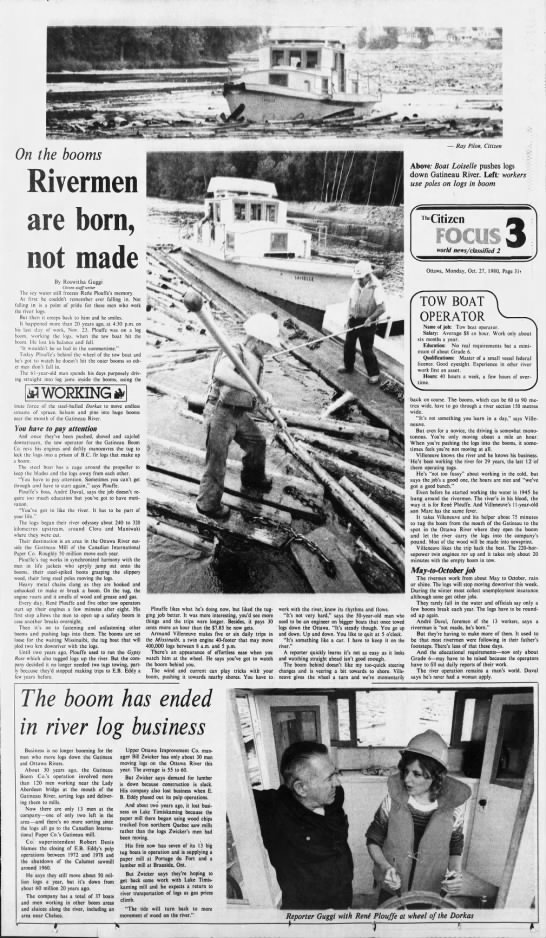
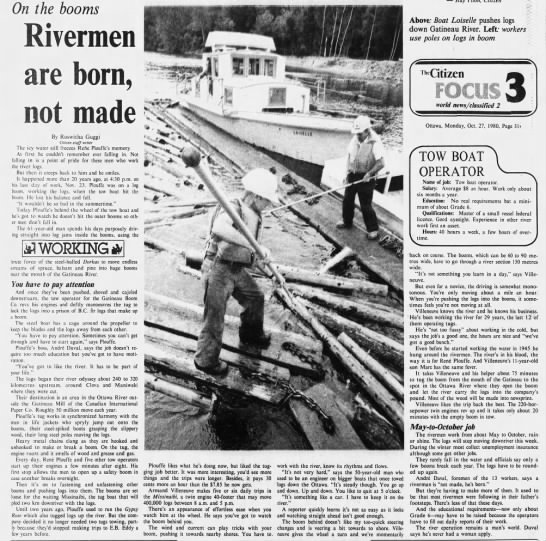
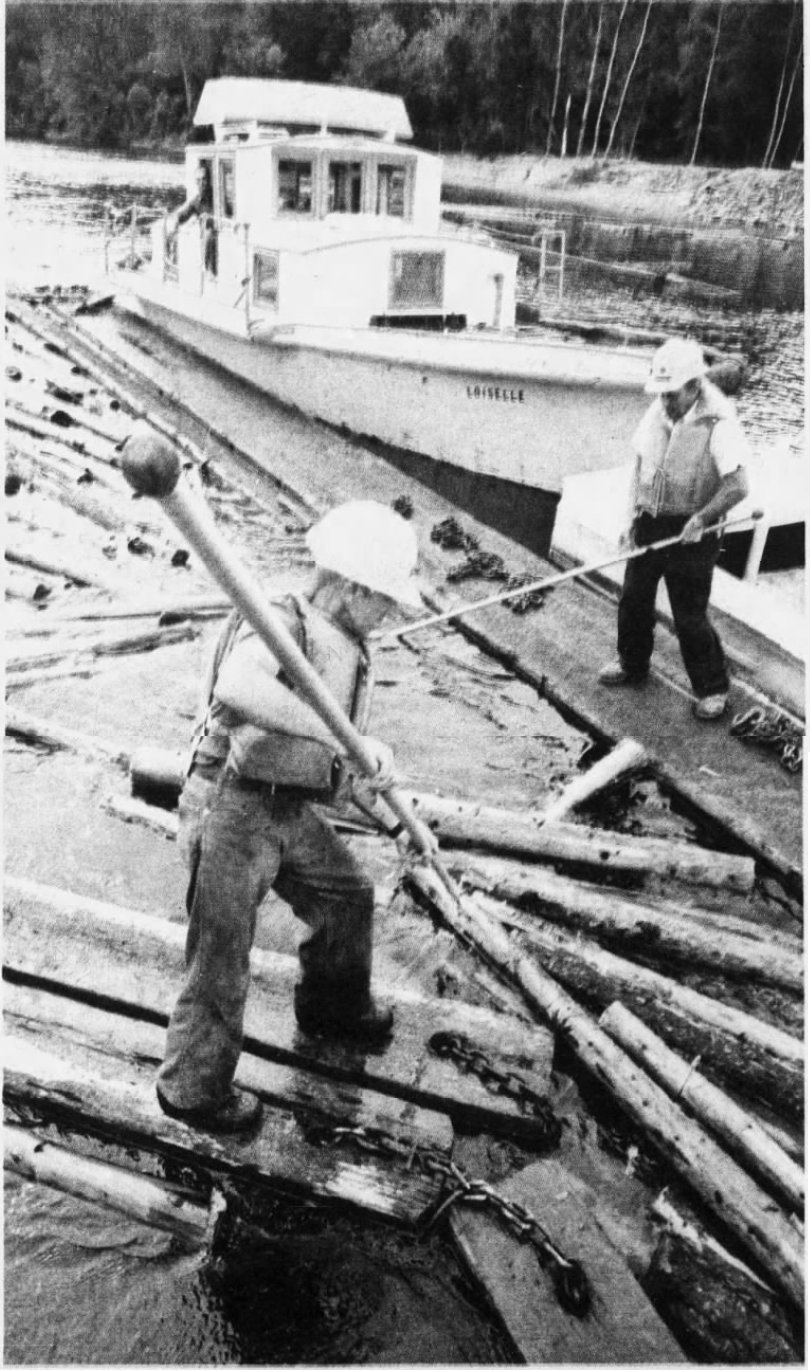
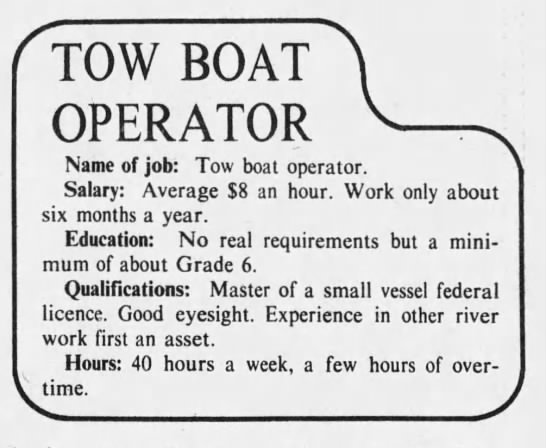
|
Mon. Oct. 27, 1980, Page 31 - The Ottawa Citizen - River Men are born, not made
By Roswitha Guggi Citizen staff writer.
The icy water still freezes Rene Plouffe's memory. At first he couldn't remember ever falling in. Not falling in is a point of pride for these men who work the river logs. But then it creeps back to him and he smiles. It happened more than 20 years ago, at 4:30 p.m. on his last day of work, Nov. 23. Plouffe was on a log boom, working the logs, when the tow boat hit the boom. He lost his balance and fell. "It wouldn't be so bad in the summertime."
Today Plouffe's behind the wheel of the tow boat and he's got to watch he doesn't hit the outer booms so other men don't fall in. The 61-year-old man spends his days purposely driving straight into log jams inside the booms, using the brute force of the steel-hulled Dorkas to move endless streams of spruce, balsam and pine into huge booms near the mouth of the Gatineau River. You have to pay attention And once they've been pushed, shoved and cajoled downstream, the tow operator for the Gatineau Boom Co. revs his engines and deftly manoeuvres the tug to lock the logs into a prison of B.C. fir logs that make up a boom.
The steel boat has a cage around the propeller to keep the blades and the logs away from each other. "You have to pay attention. Sometimes you can't get through and have to start again," says Plouffe. Plouffe's boss, Andre Duval, says the job doesn't require too much education but you've got to have motivation. "You've got to like the river. It has to be part of your life."
The logs began their river odyssey about 240 to 320 kilometres upstream, around Clova and Maniwaki where they were cut. Their destination is an area in the Ottawa River outside the Gatineau Mill of the Canadian International Paper Co. Roughly 50 million move each year. Plouffe's tug works in synchronized harmony with the men in life jackets who spryly jump out onto the booms, their steel-spiked boots grasping the slippery wood, their long steel poles moving the logs. Heavy metal chains clang as they are hooked and unhooked to make or break a boom.
On the tug, the engine roars and it smells of wood and grease and gas. Every day, Rene Plouffe and five other tow operators start up their engines a few minutes after eight. His first stop allows the men to open up a safety boom in case another breaks overnight. Then it's on to fastening and unfastening other booms and pushing logs into them. The booms are set loose for the waiting Missinaibi, the tug boat that will plod two km downriver with the logs.
Until two years ago, Plouffe used to run the Gypsy Rose which also tugged logs up the river. But the company decided it no longer needed two tugs towing, partly because they'd stopped making trips to E.B. Eddy a few years before. Plouffe likes what he's doing now, but liked the tugging job better. It was more interesting, you'd see more things and the trips were longer. Besides, it pays 30
cents more an hour than the $7.85 he now gets.
Armand Villeneuve makes five or six daily trips in the Missinaibi, a twin engine 40-footer that may move 400,000 logs between 8 a.m. and 5 p.m. There's an appearance of effortless ease when you watch him at the wheel. He says you've got to watch the boom behind you. The wind and current can play tricks with your boom, pushing it towards nearby shores. You have to work with the river, know its rhythms and flows, "It's not very hard," says the 50-year-old man who used to be an engineer on bigger boats that once towed logs down the Ottawa. "It's steady though. You go up and down. Up and down. You like to quit at 5 o'clock.
"It's something like a car. I have to keep it on the river."
A reporter quickly learns it's not as easy as it looks
and watching straight ahead isn't good enough. The boom behind doesn't like my too-quick steering changes and is veering a bit towards to shore. Villeneuve gives the wheel a turn and we're momentarily back on course. The booms, which can be 60 to 90 metres wide, have to go through a river section 150 metres wide.
"It's not something you learn in a day," says Villeneuve. But even for a novice, the driving is somewhat monotonous. You're only moving about a mile an hour. When you're pushing the logs into the booms, it sometimes feels you're not moving at all.
Villeneuve knows the river and he knows his business. He's been working the river for 29 years, the last 12 of them operating tugs. He's "not too fussy" about working in the cold, but says the job's a good one, the hours are nice and "we've got a good bunch."
Even before he started working the water in 1945 he hung around the rivermen. The river's in his blood, the way it is for Rene Plouffe. And Villeneuve's 11-year-old son Marc has the same fever. It takes Villeneuve and his helper about 75 minutes to tug the boom from the mouth of the Gatineau to the spot in the Ottawa River where they open the boom and let the river carry the logs into the company's pound. Most of the wood will be made into newsprint.
Villeneuve likes the trip back the best. The 220-horsepower twin engines rev up and it takes only about 20 minutes with the empty boom in tow.
May-to-October job
The rivermen work from about May to October, rain or shine. The logs will stop moving downriver this week. During the winter most collect unemployment insurance, although some get other jobs. They rarely fall in the water and officials say only a few booms break each year. The logs have to be rounded up again. Andre Duval, foremen of the 13 workers, says a riverman is "not made, he's born."
But they're having to make more of them. It used to be that most rivermen were following in their father's footsteps. There's less of that these days. And the educational requirements now only about Grade 6 may have to be raised because the operators have to fill out daily reports of their work. The river operation remains a man's world. Duval says he's never had a woman apply.
TOW BOAT OPERATOR Name of job: Tow boat operator Salary: Average $8 an hour. Work only about six months a year. Education: No real requirements but a minimum of about Grade 6. Qualifications: Master of a small vessel federal licence. Good eyesight. Experience in other river work first an asset. Hours: 40 hours a week, a few hours of overtime.
|
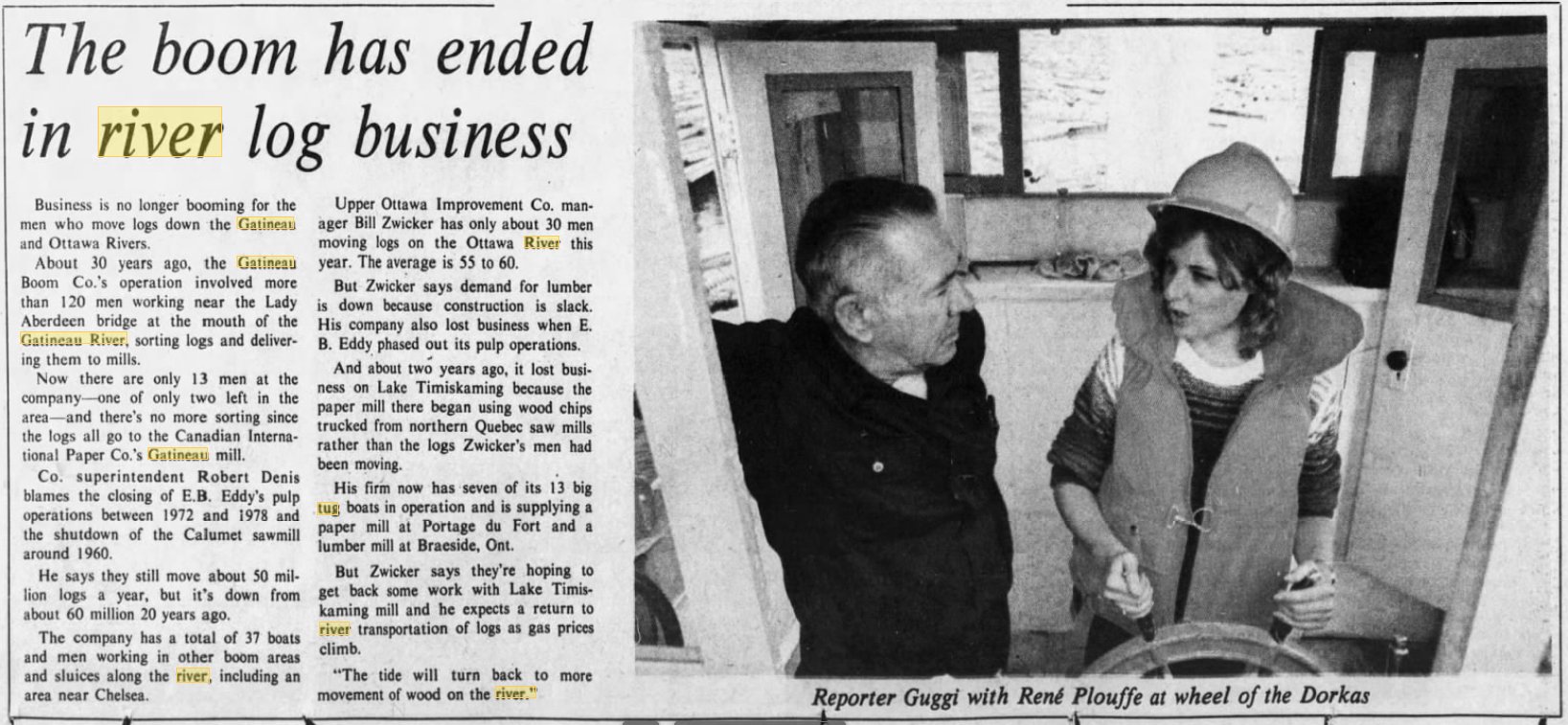 |
Mon. Oct. 27, 1980, Page 31 - The Ottawa Citizen - The boom has ended in river log business
Business is no longer booming for the men who move logs down the Gatineau and Ottawa Rivers. About 30 years ago, the Gatineau Boom Co.'s operation involved more than 120 men working near the Lady Aberdeen bridge at the mouth of the Gatineau River, sorting logs and delivering them to mills. Now there are only 13 men at the company one of only two left in the area and there's no more sorting since the logs all go to the Canadian International Paper Co.'s Gatineau mill.
Co. superintendent Robert Denis blames the closing of E.B. Eddy's pulp operations between 1972 and 1978 and the shutdown of the Calumet sawmill around 1960. He says they still move about 50 million logs a year, but it's down from about 60 million 20 years ago. The company has a total of 37 boats and men working in other boom areas and sluices along the river, including an area near Chelsea.
Upper Ottawa Improvement Co. manager Bill Zwicker has only about 30 men moving logs on the Ottawa River this year. The average is 55 to 60. But Zwicker says demand for lumber is down because construction is slack. His company also lost business when E. B. Eddy phased out its pulp operations. And about two years ago, it lost business on Lake Timiskaming because the paper mill there began using wood chips trucked from northern Quebec saw mills rather than the logs Zwicker's men had been moving.
His firm now has seven of its 13 big tug boats in operation and is supplying a paper mill at Portage du Fort and a lumber mill at Braeside, Ont. But Zwicker says they're hoping to get back some work with Lake Timiskaming mill and he expects a return to river transportation of logs as gas prices climb. "The tide will turn back to more movement of wood on the river."
|
F. Loiselle in the Rockcliffe marina, Ottawa, Ontario. Photos courtesy Jim Freeth of ODS Marine.
Click to enlarge to 2048 pixels wide.
F. Loiselle beside workboat Telmond, Ottawa, Ontario. Photos courtesy Jim Freeth of ODS Marine.
Click to enlarge to 640 pixels wide.
F. Loiselle, Ottawa, Ontario. Photos courtesy Jim Freeth of ODS Marine.
Click to enlarge to 640 pixels wide.
Aug. 30, 2019, Steve Briggs notes: Hull 730 does not seem to have a name on it anymore, but I think there is no doubt it it the F. Loiselle. Transport Canada Details for registered vessel F. LOISELLE (O.N. 177896) Owners
Name BERNARD BENAC
Address PO BOX 74073 RPO BEECHWOOD
City OTTAWA
Country CANADA
Postal Code K1M 2H9.
Hull 730 photos by Bruce Colman, Aug. 29, 2019, Oziles' Marina, Orl�ans, ON.
Hull 730 photos by Bruce Colman, Aug. 29, 2019, Oziles' Marina, Orl�ans, ON.
Colorized Hull 730 photos by Bruce Colman, Aug. 29, 2019, Oziles' Marina, Orl�ans, ON.
In late 2019, Ozile's was home to F. Loiselle, Dorcas K., and Simonne M.
For more Russel exhibits visit Owen Sound Marine & Rail Museum 1165 1st Ave West, Owen Sound, ON N4K 4K8
(519) 371-3333  http://marinerail.com http://marinerail.com |
|
|
|
|
|